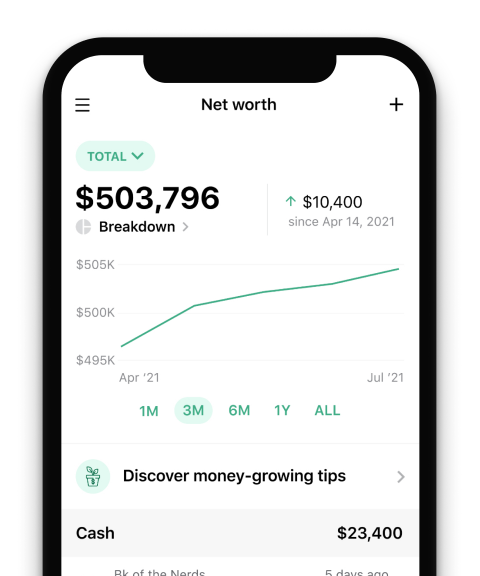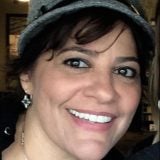Smart Money Podcast: Investing for Your Dream Life
Many, or all, of the products featured on this page are from our advertising partners who compensate us when you take certain actions on our website or click to take an action on their website. However, this does not influence our evaluations. Our opinions are our own. Here is a list of our partners and here's how we make money.
Welcome to NerdWallet’s Smart Money podcast, where we answer your real-world money questions.
This week we’re running an episode from our financial dream series, where we talk with Nerds who have accomplished their financial dreams and interview outside guests about what they want to do with their money in 2022.
Check out this episode on any of these platforms:
Our take
To build wealth over the long term — and beat inflation — investing in various forms is your best bet.
Starting off by saving for retirement can be low-hanging fruit. Many financial advisors suggest contributing enough to an employer retirement plan to at least get the match. Then think about contributing to a Roth IRA so you can have some tax diversification among your retirement savings.
Beyond that, many new investors find that robo-advisors are an easy way to get started investing without having to spend a lot of money. You can schedule automatic deposits into these accounts monthly so your wealth can grow without you having to think about it or do much beyond the initial setup.
And if you’re raising a family and want to save for your kid’s college education, look into a 529 account. With a 529, your money grows tax-deferred. And when used for qualified expenses, the withdrawals are tax-free.
Our tips
Make money moves easier. Automate contributions to investment accounts and consider a robo-advisor account.
Know your retirement account options. Even if you have a 401(k) or SEP (Simplified Employee Pension) IRA, think about opening a Roth IRA to diversify your tax situation.
Check out 529 plans for college savings. Your money grows tax-deferred and withdrawals are tax-free when used for qualified education expenses.

More about investing on NerdWallet: 529 Plans for College Savings: 529 Plans Listed by State Best Retirement Plans: Choose the Right Account for You What Is Inflation, and Why Is It Surging?
Have a money question? Text or call us at 901-730-6373. Or you can email us at [email protected]. To hear previous episodes, go to the podcast homepage.
Episode transcript
Sean Pyles: Welcome to the NerdWallet Smart Money podcast, where we usually answer your personal finance questions and help you feel a little smarter about what you do with your money. I'm Sean Pyles.
Liz Weston: I'm Liz Weston. To send the Nerds your money questions, call or text us on the Nerd hotline at 901-730-6373. That's 901-730-NERD, or email us at [email protected]. Also, hit that subscribe button to get new episodes delivered to your devices every Monday. If you like what you hear, please leave us a review and tell a friend.
Sean Pyles: This week, we are continuing our series of episodes about financial dreams, where we talk with Nerds who have accomplished their financial dreams and interview a few special guests about what they want to do with their money in 2022. Since we're NerdWallet, we will also discuss the steps you can take to accomplish your own financial dreams, whatever they are.
Liz Weston: This time around. We're talking with DIY and home decor YouTuber Angel Grace about her experience starting her own business and her investing goals for 2022. Welcome to the podcast, Angel.
Angel Grace: Hi.
Sean Pyles: It's great to have you on. Angel, I would love to start off by hearing a bit about your background and how you got into DIY projects and home decor.
Angel Grace: Sure. I started doing DIY projects when my husband and I first married. We bought our first home and at that time we didn't have huge budgets for a lot of the stuff we wanted done. We ended up doing a lot of DIY and in that, home decor became a part of it, because I like to make my space a happy place. I feel like when you surround yourself with things that bring you joy, and it excites you, it just literally changes the feel and the mood of your whole environment.
Sean Pyles: Right.
Liz Weston: It so does. Did you have a background in design or art or anything like that?
Angel Grace: Actually, no. I have a background in accounting and law, so I was a lawyer.
Liz Weston: OK.
Angel Grace: Yeah. So, really crazy background.
Sean Pyles: Yeah. I imagine it was a nice creative outlet after working with numbers and rules all day long.
Angel Grace: Yes, very much so. Very much.
Sean Pyles: Great. Well, let's turn to your financial dreams for 2022. What do you want to do in the next year?
Angel Grace: I really want to focus more on my long-term financial health, as well as more passive income strategies. That's the goal.
Sean Pyles: OK. What specifically are you thinking of looking into in those two areas?
Angel Grace: I want to do some investing and put more into just money that grows on its own for the most part. Then also retirement purposes.
Sean Pyles: Yeah.
Angel Grace: Trying to get set up, so that my future is more secure.
Sean Pyles: Yeah.
Liz Weston: You have kids?
Angel Grace: I do. I have a toddler.
Liz Weston: Oh my goodness and you have a business.
Angel Grace: Yes.
Liz Weston: You got a lot to do, so you don't have a lot of time to mess around with investing, that sounds like.
Angel Grace: Well, I used to do some DIY investing years ago, but life did hit and things fell off, but I want to get back into it, but I don't want to be like actively having to manage my portfolio.
I prefer passively, so ways and strategies that I can put money there and build my own portfolio, but at the same time, not have to worry so much about day to day activities with it.
Sean Pyles: Have you looked at all into opening a robo-advisor account or do you have one of those already?
Angel Grace: I do not. No. Can you explain more?
Sean Pyles: Yeah, they might be a nice way to get started investing, because you can open one of these accounts and there are a number of them around on the internet at this point. Basically the way I do it with my robo-advisory account, is I have a set amount that I deposit monthly and it manages my investments for me. I told it my risk level and how I want to manage my investments in general and it basically does all of the heavy lifting for me, because similar to you, I didn't want to get too bogged down in choosing specific companies to invest in. It sounded like a lot of work to me and I didn't want to invest all of that time when I could have a computer do it for me, basically.
Angel Grace: Wow. Yeah. That sounds really interesting and something right down what I'm looking for.
Sean Pyles: Yeah. And similar, there are also a number of investment apps out there that have gained a lot of mainstream popularity in the past year, like Acorns and Stash, and even Cash App is doing some of this right now. Some of these companies will round up your purchases to the nearest dollar and then use that to invest and those can be a good way to get started, but they're not really a comprehensive enough way, in my opinion, to get a full investment portfolio going, even though they are super popular right now.
Angel Grace: Nice.
Liz Weston: Angel, we thought we may have to talk you out of active investing, because a lot of people are really into investing in individual stocks or crypto or whatever.
Sean Pyles: Uh-huh.
Liz Weston: And the reality is that most people who try to beat the market actually fail. So all that trading actually just adds costs to your investing and makes you do worse than you'd do if you just stuck with index funds or index exchange-traded funds that try to match the market and keep expenses really, really low. The two things that we can really control about investing are how much we put in and how much we pay. That's where robo-advisors really shine, because their costs are super, super low.
Angel Grace: Wow.
Liz Weston: In addition to everything that Sean said about doing all the heavy lifting for you, they're also pretty cheap.
Angel Grace: Oh wow. That is so good to know. I'm so glad you guys are telling me this. These are great tips, because this is exactly what I wanted.
Sean Pyles: We are super happy to help you because when I hear people get interested and talk about DIY investing, my ears perk a little bit because I worry that they're going to get super into crypto or really into [movie theater chain and meme-investor focus] AMC or something like this. I just worry about what that could mean for their long-term financial health and investment goals.
Angel Grace: Yeah, I totally agree. It's so true and I've been down that road years ago and it's just so much easier when you can go on with life, but still have a say-so on your portfolio and things and how you want to make money.
Sean Pyles: Especially as a young mom, I'm sure you have enough to manage around your household plus your business.
Angel Grace: Yes.
Sean Pyles: For me, I think of my investment in my robo-advisor account as basically another line item on my budget that I have to manage monthly and it's automated. I don't have to think about it, but I can go into my account, see the growth that's happening, and also get a little bit of an understanding of how the investments that I have chosen the algorithm to manage for me are playing out. You can still learn about different investments, but it's less complicated. You don't have to research a specific company per se that you're investing in.
Angel Grace: Very nice.
Sean Pyles: You also touched on investing and saving for retirement. How are you currently approaching that?
Angel Grace: I currently have two retirement accounts, but I haven't been contributing as much as I want to and being stable and you know, I actually forget a lot of times. I really want to find a way that it's kind of like automatic and you know, I don't have to really worry about it.
Sean Pyles: Automation is the key for so many things in my philosophy of managing personal finance, because I don't want to have to think about things either. I want them to be set up and doing their own thing. We can totally talk about doing that as well with your retirement accounts. You mentioned that you have a couple, are they 401(k)s? Are they Roth IRAs? Do you know what you're working with right now?
Angel Grace: Yeah. One was a retirement account for self-employed. Goodness, I cannot remember the name of it.
Liz Weston: It's probably a SEP, SEP IRA?
Angel Grace: Yes, yes, yes. That's it.
Liz Weston: Yeah.
Angel Grace: Yes. Thanks. Yes and then another one was one I had while I was working.
Liz Weston: Oh. It's like a 401(k) that's left over from a job?
Angel Grace: It is from the other one. Yeah.
Liz Weston: OK.
Angel Grace: It's just still there. I haven't like transferred anything. It is just still there.
Liz Weston: Well, I'm actually writing a column about that right now that people think they have to do something with their 401(k) when they leave a job and you don't.
Angel Grace: Oh.
Liz Weston: You can leave it right where it is. That's fine.
Angel Grace: Nice.
Liz Weston: Yeah. If you ever do work again for a company that has a 401(k), often you can just transfer it straight into that new 401(k) plan.
Angel Grace: Oh.
Liz Weston: Don't feel bad about leaving it behind, it's protected, it's fiduciary and fiduciary means that the plan is required to put your interest first. You don't have to worry about somebody selling you a bad investment or selling you an investment that makes them more than it makes you.
Angel Grace: Wow.
Liz Weston: Having that 401(k) is great.
Angel Grace: Oh God, I'm so glad you said that. That is so good to hear. I did not know that at all.
Liz Weston: Yeah. People feel guilty about leaving a retirement account behind and you don't want to lose track of it, obviously. You want to have that money when you get to retirement.
Angel Grace: Right.
Liz Weston: But you don't necessarily have to do anything with it right now. You can let it ride for a while.
Angel Grace: Great. Thanks.
Sean Pyles: One thing that Liz and I should totally throw in is that we are not retirement or investment advisors. This is just for educational and entertainment purposes, just to make sure that we don't go foul of our legal department.
Angel Grace: I totally understand.
Sean Pyles: Yeah.
Angel Grace: But I appreciate your tips.
Sean Pyles: Yeah, of course.
Angel Grace: Very helpful.
Sean Pyles: But I do think there could be a way for you to utilize your SEP IRA a little more. Liz, I know that you have some experience with those hands-on and you don't automate payments, you have like a big annual chunk that you put in, is that correct?
Liz Weston: Yeah, basically, because SEPs can be up to, I think 25% of your self-employment net income, but you don't find out until the end of the year what that net income is going to be. What we do, is we have our accountant try to keep track of where we are and give me some rough idea of how much money I need to set aside. But you don't actually have to make the deposit until your tax filing deadline, April 15, basically of the following year.
Angel Grace: OK.
Liz Weston: Yeah.
Sean Pyles: Is there a way to automate monthly contributions? I'm thinking about how we can make this as easy as possible so that this doesn't have to be another thing on Angel's mind to manage come tax season.
Liz Weston: Yeah, that's a really good question. Because you could kind of roughly figure out where you're going to be and start making those contributions. You don't have to wait till the end of the year, if you don't want to.
Angel Grace: OK.
Liz Weston: If you put too much in, you'd have to take it back out. You definitely want to work with an accountant. Do you have a CPA for your business? Or do you do it all yourself?
Angel Grace: Actually, I'm doing it myself.
Liz Weston: Uh-huh.
Angel Grace: You know, my background is accounting.
Sean Pyles: Yeah, yeah.
Liz Weston: It might be nice to have your own accountant, though. I mean I have my own financial planner, and it's great to be able to bounce ideas back and forth and just be able to outsource some of those decisions. Not to say you have to do it right now.
Angel Grace: No, no, no. Very true. That's another story. I have tried to look for some, but it, they just did not work out.
Liz Weston: Yeah, we had to go through a few before we found the right person. It does take a while.
Angel Grace: Yeah. OK.
Sean Pyles: But one thing that I think is really great about how you're managing your retirement savings, is that you do have multiple accounts. That's something I've become really fond of in the past year where I have my 401(k) through NerdWallet, but I also have a Roth IRA that I've set up with a company online. Similar to how I do my robo-advisor account, I have monthly contributions that will invest in that as well. That way I have tax diversification in retirement, I don't have to think about how I am saving for retirement. It's just happening automatically.
Angel Grace: Oh sweet. Yeah. Very smart.
Liz Weston: You could definitely do that. If you know that you're going to be able to put in say $6,000 [a year] to a Roth IRA, that you can set up on automatic and make sure that just goes in every month.
Angel Grace: Oh, great.
Liz Weston: Then worry about the SEP when you get to the end of the year. Because you can have both. I think a lot of people think you can have one or the other. You know, with IRAs, you have them both.
Angel Grace: Yeah, I didn't realize that.
Liz Weston: How old is your baby? You said you have a toddler.
Angel Grace: I do. He's turning 2 in February.
Liz Weston: Oh. Oh, my gosh.
Sean Pyles: So exciting.
Angel Grace: Yeah. Our hands are full over here.
Liz Weston: No kidding. Oh my gosh.
Angel Grace: Yeah.
Liz Weston: Mine just turned 19.
Angel Grace: Oh wow. Congrats.
Liz Weston: Thank you. Whatever. Yeah. She's alive. Yay. Whatever they tell you, I mean, people always say it goes so fast and when they're toddlers, you're thinking that's insane. These are the longest days of my life. Honest they do. I mean the days are long, the years are short.
Angel Grace: I really believe that, because I feel like he was just born. I feel like I was just burping him. Now, I'm like give me a kiss and he runs. I definitely believe you when you say that, because I feel like he grew overnight already.
Sean Pyles: Is there anything else that you are thinking about in terms of how to set your son up for their financial future? Have you looked into starting a 529 account for college savings?
Angel Grace: I actually have not. That's a good thing to start. To think about, because I do want him to be set up as well for the future. Can you talk about that more and explain that more?
Sean Pyles: I'll punt that to Liz because she has hands-on experience with it.
Liz Weston: Well, and I'll start this out saying by saving anything for your child, you actually increase the chances that they go to college. It's really amazing. Even small amounts.
Angel Grace: Nice. Well, we have a savings. We just have not done the account.
Liz Weston: Yeah.
Angel Grace: It's crazy, because the way we structure everything for him, the goal was not for gifts, baby showers, everything. When we started, our mission was to have a savings for him.
Liz Weston: Awesome.
Angel Grace: Everybody in the family, grandmom, everybody just gives him money and it goes into his savings, because you know, toys only go so far. He gets toys, yes. But everybody contributes money financial wise, because we do want his future set up. He definitely, he has a lot of money right now.
Liz Weston: Good.
Angel Grace: Can I have some money?
Sean Pyles: Got baby with a positive net worth.
Liz Weston: Yes.
Angel Grace: Yeah.
Liz Weston: That is huge. What your family's doing is so great, because you're going to have enough plastic crap around the house, what you really need is money for the future.
Angel Grace: Yes. Yeah.
Liz Weston: What state do you live in?
Angel Grace: I'm in Georgia.
Liz Weston: Georgia. OK. I don't know much about Georgia's plan, but every state has a 529 college savings plan and they're all a little bit different, but they all basically allow you to start contributing, like it could be $25 a month, $15 a month. It's fairly small and then the money can build up and you can invest it. I think all of the 529s have an age-weighted option. Again, you don't have to think about it. You put the money in and it gets more conservative as college gets closer.
The great part is that you can also ask your family to contribute, and they can put money directly in for your child. Another thing that's important to know is does it really hurt your child's chances of getting financial aid, if that's a concern down the road? It's treated as your asset. It basically gets really good treatment in financial aid formulas. It's a win-win, and a lot of states give you a tax break too for putting the money in.
Angel Grace: Oh, nice.
Liz Weston: Yeah. Definitely something to check out, and the plans are really happy to have you on board.
Angel Grace: Yeah.
Liz Weston: Oh, the other thing I should say is that you can use the money anywhere. You're not required to use it in the state of Georgia. You can use it wherever you want to go. That's another positive.
Angel Grace: Oh, interesting.
Liz Weston: Yeah. Even some international schools you can use them for.
Angel Grace: Really?
Liz Weston: Yeah. Sometimes you get a tax break going in. It's always tax-deferred as the money is growing and then when you pull it out, it's tax-free. If you use it for qualified education expenses.
Angel Grace: Oh wow. Yeah. Definitely something we need to look into.
Sean Pyles: Well, especially because your kid is still so young, you have a great time horizon, plenty of years to start saving and get a good lump sum built up for college.
Angel Grace: So true. So true.
Sean Pyles: All right. Well, Angel, I am so glad we got a chance to talk with you. Thank you so much for sharing your story and your financial dreams for 2022.
Angel Grace: Same here. Thank you guys so much for all the helpful tips and advice. I definitely appreciate you guys having me.
Sean Pyles: Yeah. We're happy to help. With that, let's get on to our takeaway tips, and I can kick us off. First up, make your money easy, automate contributions to investment accounts and consider a robo-advisor account.
Liz Weston: Next, know your retirement account options. Even if you have a 401(k) or a SEP IRA, think about opening a Roth IRA to diversify your tax situation.
Sean Pyles: Lastly, check out 529 plans for college savings. Your money grows tax-deferred and withdrawals are tax-free when used for qualified education expenses.
Liz Weston: That's all we have for this episode. If you want your money questions answered on a future episode, turn to the Nerds and call or text us your questions at 901-730-6373, that's 901-730-NERD. You can also email us at [email protected]. Visit nerdwallet.com/podcast for more information on this episode and remember to subscribe, rate and review us wherever you're getting this podcast.
Sean Pyles: Here is our brief disclaimer, thoughtfully crafted by NerdWallet's legal team. Your questions are answered by knowledgeable and talented finance writers, but we are not financial or investment advisors. This Nerdy info is provided for general educational and entertainment purposes, and may not apply to your specific circumstances.
Liz Weston: With that said, until next time, turn to the Nerds.


